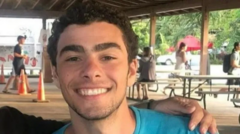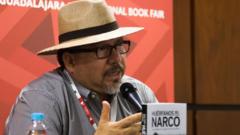The murder of UnitedHealthcare CEO Brian Thompson has sparked a disturbing trend online, as many have turned their focus onto his alleged killer, Luigi Mangione. This fascination reflects the growing discontent towards the healthcare system, with social media amplifying the narrative that glorifies Mangione rather than mourning the victim.
Social Media's Dark Turn: The Glorification of a Healthcare CEO's Murder Suspect

Social Media's Dark Turn: The Glorification of a Healthcare CEO's Murder Suspect
A look into how the murder of UnitedHealthcare CEO Brian Thompson has triggered a bizarre internet fixation on his accused killer, revealing deeper societal frustrations with the healthcare system.
**Article Text:**
In a troubling manifestation of social media’s influence, the murder of UnitedHealthcare CEO Brian Thompson has culminated in a bizarre and dark fascination with the man accused of the crime, Luigi Mangione. Just days following the incident on December 4, a small group of young men gathered in Washington Square Park for a lookalike contest for Mangione, underscoring how his image has transcended mere notoriety into something resembling idolization.
Talia Jane, a journalist at the scene, pointed to the broader public sentiment regarding the healthcare system in America, indicating the killing has amplified existing frustrations. This socio-political undercurrent has ignited a social media frenzy dedicated to Mangione, who is now being treated as a folk hero among certain online communities.
From TikTok to Spotify, homage to Mangione has proliferated. Video tours depicting the "CEO assassin" found traction among users hungry for provocative content. While some might view this behavior as an online joke, it reveals a keen discontent among many young people regarding the perceived injustices of American private health insurers.
Notably, Luigi Mangione’s background—an Ivy League education and affiliation with an affluent Baltimore family—has not deterred a wave of online support. Many TikTok users describe him enthusiastically, with some dubbing him the "hot assassin." This phenomenon serves as a reminder of how society often romanticizes male criminals, leading to disturbing cult followings. Renowned cultural critic Blakely Thornton expressed concerns about this trend, noting that the adoration aligns with a societal predilection to empathize with attractive men, regardless of their actions.
Critics have condemned the glorification of Mangione, including Pennsylvania Governor Josh Shapiro, who emphasized the dangers of vigilante justice in civilized society. In the whirlwind of admiration for Mangione, the broader dialogue surrounding Thompson's murder appears to overshadow the personal tragedy; many social media users seem more focused on the suspect’s persona than honoring the victim.
The aftermath of the shooting has borne significant online upheaval, with hashtags like #EatTheRich and #FreeLuigi trending widely and attracting attention across various social media platforms. The Network Contagion Research Institute reported that engagement surrounding Thompson’s murder surpassed previous instances of politically motivated violence online, signaling a cultural shift in how society consumes such narratives.
Furthermore, research shows a troubling percentage of young adults have suffered from dissatisfaction with their health insurance, providing a backdrop for the outrage manifesting in support for Mangione. As activists and patients like Jenn Coffey continue to speak out against cavalier healthcare practices, they recognize an unsettling reality grounded in the unfortunate intersection of violence and political commentary.
Thompson, who was remembered by colleagues as a dedicated professional, has become almost a footnote in a fervent online debate that swirls around Mangione. In his last public message, Thompson expressed a commitment to making healthcare more accessible, a cause that many feel was tragically ignored in the public discourse following his untimely death.
With public sentiment increasingly polarized, this instance highlights the issues and frustrations embedded within the U.S. healthcare system while posing essential questions surrounding moral accountability and the ramifications of glorifying violence online. Thus, as conversations ensue on various platforms, many are left grappling with the unsettling reality of where society finds its heroes.
In a troubling manifestation of social media’s influence, the murder of UnitedHealthcare CEO Brian Thompson has culminated in a bizarre and dark fascination with the man accused of the crime, Luigi Mangione. Just days following the incident on December 4, a small group of young men gathered in Washington Square Park for a lookalike contest for Mangione, underscoring how his image has transcended mere notoriety into something resembling idolization.
Talia Jane, a journalist at the scene, pointed to the broader public sentiment regarding the healthcare system in America, indicating the killing has amplified existing frustrations. This socio-political undercurrent has ignited a social media frenzy dedicated to Mangione, who is now being treated as a folk hero among certain online communities.
From TikTok to Spotify, homage to Mangione has proliferated. Video tours depicting the "CEO assassin" found traction among users hungry for provocative content. While some might view this behavior as an online joke, it reveals a keen discontent among many young people regarding the perceived injustices of American private health insurers.
Notably, Luigi Mangione’s background—an Ivy League education and affiliation with an affluent Baltimore family—has not deterred a wave of online support. Many TikTok users describe him enthusiastically, with some dubbing him the "hot assassin." This phenomenon serves as a reminder of how society often romanticizes male criminals, leading to disturbing cult followings. Renowned cultural critic Blakely Thornton expressed concerns about this trend, noting that the adoration aligns with a societal predilection to empathize with attractive men, regardless of their actions.
Critics have condemned the glorification of Mangione, including Pennsylvania Governor Josh Shapiro, who emphasized the dangers of vigilante justice in civilized society. In the whirlwind of admiration for Mangione, the broader dialogue surrounding Thompson's murder appears to overshadow the personal tragedy; many social media users seem more focused on the suspect’s persona than honoring the victim.
The aftermath of the shooting has borne significant online upheaval, with hashtags like #EatTheRich and #FreeLuigi trending widely and attracting attention across various social media platforms. The Network Contagion Research Institute reported that engagement surrounding Thompson’s murder surpassed previous instances of politically motivated violence online, signaling a cultural shift in how society consumes such narratives.
Furthermore, research shows a troubling percentage of young adults have suffered from dissatisfaction with their health insurance, providing a backdrop for the outrage manifesting in support for Mangione. As activists and patients like Jenn Coffey continue to speak out against cavalier healthcare practices, they recognize an unsettling reality grounded in the unfortunate intersection of violence and political commentary.
Thompson, who was remembered by colleagues as a dedicated professional, has become almost a footnote in a fervent online debate that swirls around Mangione. In his last public message, Thompson expressed a commitment to making healthcare more accessible, a cause that many feel was tragically ignored in the public discourse following his untimely death.
With public sentiment increasingly polarized, this instance highlights the issues and frustrations embedded within the U.S. healthcare system while posing essential questions surrounding moral accountability and the ramifications of glorifying violence online. Thus, as conversations ensue on various platforms, many are left grappling with the unsettling reality of where society finds its heroes.




















